New Video from Chris Van Dine about P4P
Downhill rider and philanthropist Chris Van Dine shows one of his second homes in Guatemala, where he rides and contributes to society development at the same time.
Downhill rider and philanthropist Chris Van Dine shows one of his second homes in Guatemala, where he rides and contributes to society development at the same time.
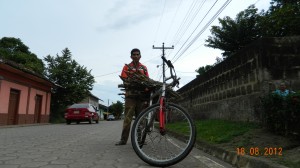
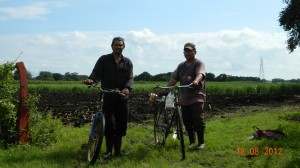
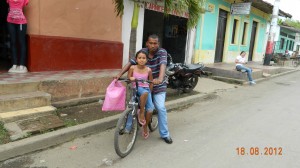
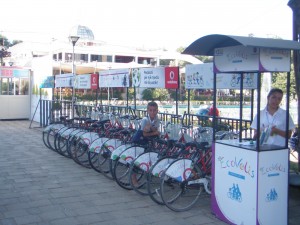
Ecovolis is a bike-sharing system based in Albania’s capital, Tirana. Initiated over two years ago, this program has revolutionized the city’s transportation and circulation scheme. There was a very real necessity to create a solution to the congestion and pollution in the car-filled streets of Tirana, and it is largely due to the donations of bicycles and the great work done by Ecovolis’s strongest partner, Pedals for Progress, that made the program take hold.
Since the first communication with P4P and its president, David Schweidenback, 1,465 bicycles have landed in Albania and they are all currently circulating in its streets. For a country of 3 million people, this is a great first step. Consider the fact that, after a fifty-year communist regime that forbade the personal use of automobiles, the last 20 years saw a surge in ownership of cars. The unfortunate result of this new age of consumption was that Albania became one of the most polluted countries in Europe.
As part of PASS (Programii Alternativave Sociale Stimuluese, Social Stimulating Alternative Programme), which promotes and support environmentally friendly actions, Ecovolis immediately embraced the idea of using recycled bicycles for Tirana’s bike-sharing system rather than purchasing new and potentially costly or unreliable alternatives. This system was presented to its citizens with a strong ecologic and recycling message: “Put used bicycles into good use.” People needed to be conscious of the need to reduce the pollution created by the multitude of cars that circulated in the city streets. P4P was the model we followed.
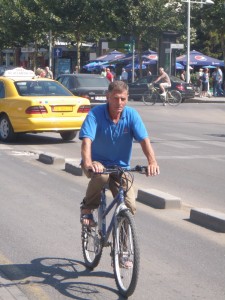
A great part of the bicycles were transformed and painted in order to become identical and be part of the bike-sharing system. However, hundreds of them were also donated to children’s organizations such as Terre des Hommes or orphanages. American efforts and involvement have created smiles on many Albanian children’s faces. Being so grateful to David and P4P, Ecovolis made a point to notify the staff of the U.S. Embassy in Tirana, who couldn’t but feel proud of the generosity and eco-friendly behavior of the people they represent here in Albania.
All in all, the shipments of those bicycles now seen in the streets of Tirana and Durrës and the sewing machines now used by associations of women in need offer a strong and concrete message to the Albanian people: Recycling and cooperating for good causes are what bring about solutions and unite people of distant nations.
by Patricia Hamill
Summer 2012 InGear
FIDESMA has established facilities in San Andrés Itzapa from which it implements its programs in all of the surrounding communities. Established in 1998, the foundation has a very clear mission: to promote the sustainable development of families and communities by initiating or supporting programs and projects in the areas of education, with technical assistance and economic aid for conservation and protection of the environment in the rural regions of Guatemala.
One grant from Japan and one from a Canadian monastery together established FIDESMA. Japan’s participation in this project enabled the foundation to erect their administrative building complete with computer labs. The foundation was also able to build satellite labs called “capacity centers” in the more remote hill regions and small towns. Each satellite lab has 4–5 computers. These labs are used solely for the purposes of teaching technological skills to those interested in this type of occupation.
The agricultural arm of the foundation exists thanks to a monastic order located in Quebec. The order had land in San Andrés and, once they became aware of what FIDESMA was setting out to accomplish, they donated a portion of this property to the foundation.
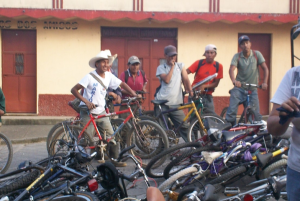
P4P partnered with FIDESMA in ’99 and, since this collaboration began, there have been more than 6,000 bicycles and close to 200 sewing machines shipped. The initial proceeds of these sales were not for discretionary spending but to use for the handicapped of the region. The unfortunate reality of life there is that children who have any type of disability, from mild physical handicaps to severe mental and physical debilitations have no opportunity for aid. There is little or no birth control in this region as well, so a severely handicapped child is most likely part of a large family, thus there is often even less money and time to attend to specialized needs. FIDESMA works to assist these families in understanding and accessing proper nutrition and consistent hygienic practices—especially for those who are especially incapacitated and unable to travel.
It’s really quite amazing how the sale of an American bike actually has enabled such products as fresh, local vegetables or a toothbrush and toothpaste to become available in a remote region in Guatemala and help an overwhelmed parent properly care for her disabled child. While these families still receive assistance, the proceeds of sales of bikes and sewing machines now also enable FIDESMA to expand their interests.
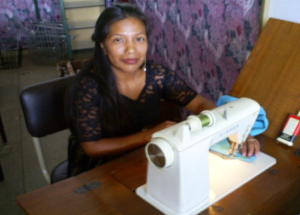
FIDESMA is fundamentally concerned with education and creating or nurturing one’s capacity to work at regular jobs or start a business. There are carpentry, baking, computer, and plumbing courses to choose from. In fact, the foundation buildings include dormitories in order to lessen students’ concern over daily travel or lodging. When you think about the combination of bicycle travel and lodging for students, two elements of this economic expansion stand out: FIDESMA is not contributing to excessive fuel consumption and is preventing pollution of the local environment.
This preservation of the community on the personal and environmental levels shows in the beaming faces in the photographs that Señora Margarita flashed before us on the screen. The audience was treated to images of small children proudly showing their perfectly sized bikes and the teenagers sporting bright red or sleek black trail bikes. Moms happily roll by with youngsters mounted behind them. One of the most memorable images was a testament to the pride that people develop when they earn rather than receive their possessions: A group of young men sporting plastic piggy banks filled with the money that they had earned and saved in order to purchase their first bikes.
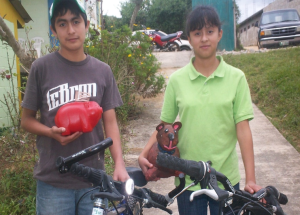
FIDESMA brings opportunity to you if you cannot come to them. Members of the foundation will take bikes out to villagers who cannot easily get to them to make the purchases. They also set up groups of bikes during feasts and holidays where there is guaranteed to be a crowd. Walk miles to celebrate? Ride home on affordable transportation.
P4P just shipped its 13th container to Guatemala. This is a long-term and strong relationship that promises to remain that way and we hope that Señora Margarita and FIDESMA’s executive director Señora Isabel Salazer will be willing to return to Hunterdon County to update us on the progress of these programs and treat us to more images of these working programs and independent business owners.
Like most young men, Maximiliano Solorzano started out working in the coffee groves in San Miguel de Dueñas, 20 miles outside of San Andrés, Guatemala. Plantation work is a common occupation in this region that sits in the shadows of the volcano El Fuego and walking to these groves and traveling about this hilly region takes a physical toll on any strong individual. When Don Max was approaching his 20th birthday, an illness that almost took his life permanently took the strength from his legs. Climbing the steep slopes to work for the coffee growers was no longer an option. He still had his nimble hands and the desire to work and be productive so he began to take on basic repair jobs around the area even though these were not initially profitable or consistent.
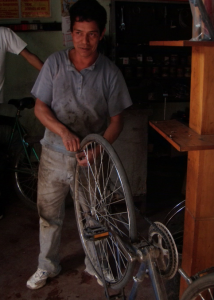 A consignment of bicycles from FIDESMA transformed his small itinerant subsistence into a steady and relevant business. The bicycle sales and repair keep Don Max and his family quite busy. The bikes themselves are a lifeline for the many other people in the area who continue to work in the groves. These days, he buys one dozen or so at a time, coming in to San Andrés twice during each container sale, looking for the much-prized and quite necessary mountain bikes. During any given day, Don Max may see numbers of clients coming in for more bikes and equipment such as new chains, spokes, and patches for tires. It is no easy feat to climb these hills; they slope so dangerously that one would expect the groves and gardens planted on them to simply slide down into a heap at the bottom. The travel is time-consuming on foot and the roads are nothing more than wide paths lacking maintenance. The road bikes that initially came to Don’s shop almost 27 years ago were still better than no wheels, but the influx of mountain bikes and their all-terrain wheels is what really turned this area into a “bicycle city” and created a demand for more bikes and an opportunity for new businesses to develop.
A consignment of bicycles from FIDESMA transformed his small itinerant subsistence into a steady and relevant business. The bicycle sales and repair keep Don Max and his family quite busy. The bikes themselves are a lifeline for the many other people in the area who continue to work in the groves. These days, he buys one dozen or so at a time, coming in to San Andrés twice during each container sale, looking for the much-prized and quite necessary mountain bikes. During any given day, Don Max may see numbers of clients coming in for more bikes and equipment such as new chains, spokes, and patches for tires. It is no easy feat to climb these hills; they slope so dangerously that one would expect the groves and gardens planted on them to simply slide down into a heap at the bottom. The travel is time-consuming on foot and the roads are nothing more than wide paths lacking maintenance. The road bikes that initially came to Don’s shop almost 27 years ago were still better than no wheels, but the influx of mountain bikes and their all-terrain wheels is what really turned this area into a “bicycle city” and created a demand for more bikes and an opportunity for new businesses to develop.
Opening up a new program—the potential of making some substantial change for the good—is always very exciting. Last May we loaded our first container to the Vinh Long Union of Friendship. ViUFO has three branches in the rural delta and other rural areas of south west Vietnam, Vung Liem and Tra On which are in Vinh Long province and Tan Phu which is in Dong Nai province. The program met with great success.
While opening a new program in a new country is exciting, having been successful and now loading the 2nd container is exhilarating. On June 2, 2012, with the financial backing of the Dariu Foundation, based in Switzerland, we are loading our 2nd container for Vietnam. Although Vietnam is almost exactly on the other side of the world, it actually happens to have the least expensive shipping costs of any of our overseas programs.
The successful entry into Vietnam of our container of bicycles is the accomplishment of the dedicated work of Nguyen Van Hanh of the Dariu Foundation. Hanh waded through a myriad of red tape and regulation to secure the import permits. And now we are about to do it again!
A giant thank you to all of the donors of bicycles in late May, your bikes will soon make a long journey to their new home. A similar thank you to all of the collectors, who took the time to take off the pedals and turn the handle bars so that we have the bikes ready to go.
Dave
by Herman Longo
UNITY IN DIVERSITY FOUNDATION (UDF) is a Non-Governmental Organization and Non-Profit Making. Registered under Companies Ordinance (Cap 212) Companies Limited by Guarantee no having a share Capital. Registered on September 28th, 2004. Certificate of Incorporation No 50181. Also we have certificate of Compliance of Non Governmental Organization Registered under Vice President’s Office given at 13th March 2006. Our Registration No is 1597. Was founded for the following reasons. To unify, train and empower financially diverse expertise of idle expertise in different trades for the purpose of running their projects effectively.
OUR VISION. UDF envisages seeing that the idle expertise are unified and empowered.
OUR MISSION. To identify, unify, and offer training in their respective expertise for the purpose of running projects that will contribute towards the increase of the national economy and to procure and manage funds to be provided to the trained grantees for using them in running their projects.
OBJECTIVES. (a) To run educational institutes from grass-root level that is Nursery school, primary school, secondary school, vocational training school, secretarial, business/commercial, tourism etc. (b) To assist the marginalized sectors of the community by providing them with relevant education and information in order to assert their rights and seek improvement of their living conditions with particular emphasis on women, street children, orphans, disabled and HIV/AIDS victims.
THE PROJECT OF BICYCLES. The Bicycles project will help the idle expertise of Tanzania who were walking on foot, transporting goods on their heads, now will be using the bicycles for transportation of agricultural crops from their farms. The bicycles will be used by women and men in productive activities. Also the bicycles will be used by students who are walking 7 kms to 10 kms going to school every day. Also the bicycles will be used by women who are walking 6 kms to 10 km seeking water. The bikes will be doing a lot of activities such as carrying pregnant mothers from the village to town. Where there is no means of transportation the bikes will be carrying sick people and pregnant mothers.
THE PROJECT OF SEWING MACHINES. The sewing machines will be used to empower idle Girls in Tanzania, idle orphans, idle widows, idle women groups, idle youth group who are lacking employment and will be employed by this project. Due to the high movements of girls who are migrating from the villages to town the only solution is to provide them with sewing machines so that to lessen them from engaging into prostitution, drug abuse, unwanted pregnancies, theft, sexual abuses, etc. The sewing machines will provide them with employment for their self sustainability, self reliance and self employment. The sewing machines will help also the people living with HIV/AIDS and women groups who are idle. They will benefit from this project so that they may be encouraged into productive activities for improving the national economy by making different clothes like table cloths for decorating the tables and selling clothes to other nearby countries like Malawi, Zambia, and DRC. The sewing machines will bring a lot of changes soon because we have so many teachers who can teach them. It takes only three to six months for a young lady to master the sewing machine.
Through the Project of Bicycles and Sewing machines the vision of UDF which is to empower the idle expertise will be achieved. Also the vision of MATABE to Make Tanzania Better will be achieved effectively because everyone will busy working and our economy will be improving day after day and there will be no famine, no drug abusers, no prostitution, the kids will be attending the school well, at last everyone will be smiling in this world.
by Patricia Hamill
Summer 2012 InGear
The night of April 20th, 2012, was an especially inspiring evening for P4P. Gathering in the intimate space of the Hunterdon Medical Center auditorium, we sponsored two wonderful presentations. The night was dedicated to a talk by Señora Maria Margarita Caté de Catú, founder of FIDESMA (Foundation for the Environment and Sustainable Development), whose organization runs economic-development programs in the rural highlands of her native country, Guatemala. Many of the programs that FIDESMA sponsors, including agricultural and technological development, are funded by the sales of bicycles and sewing machines that they receive from us.
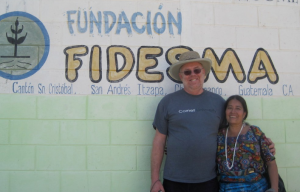
Opening for Señora Margarita, so to speak, was documentary film-maker Greg Sucharew who shared the trailer for his upcoming film, The Bicycle City. This is “the story of the struggle, determination, idealism, and hope that has brought about the transformation of an entire society.” Greg’s lens records the tangible changes occurring in Rivas, Nicaragua, thanks to organizations like Pedals for Progress who have energized the economy by making bicycles an accessible commodity for the local population. We all eagerly await the release of this important testament to the measurable success of how American citizens’ involvement in nonprofit goals affects economically limited regions and countries across the world.
On stage, Señora Margarita described the location and mission of FIDESMA before proceeding to highlight the ongoing programs, aided by a wonderful slide show of participants in the foundation’s programs. The audience witnessed students in groups or individually working at computers or attending lectures related to computer proficiency, nutrition, agriculture, and other such personally and professionally useful topics. Photos showed people of all ages and both genders using bikes to get to work or working on these bikes for a living. Multiple family members were shown proudly displaying their bikes and we were treated to the image of a mob of serious competitive cyclists at the starting line of a race. Ladies looked up from their sewing machines and large pots of agave leaves boiled on stoves in a large indoor workroom provided by FIDESMA.
A table sat nearby the stage laden with expertly woven and beautifully colored wraps, purses, scarves, and pouches made by women who have been affiliated with FIDESMA for quite some time. A number of us purchased multiple pieces and, with the aid of our trusty translators, CEO of P4P David Schweidenback and our hard-working web master Reykha Bonilla, Señora Margarita patiently explained the meaning and relevance of the colors and designs of each backstrap-woven textile. She made a point of likening a traditional motif—the partial physical connection of two passing snakes—to the relationship of FIDESMA and P4P. No, not tangled or poisonous, but interconnected and flowing and meeting together even though moving independently. It really was a pleasure to be able to spend such intimate time getting to understand both the work that was being purchased and knowing where the dollars spent were definitely going. There were lots of smiles and many laughs even with the slight delay of the language barrier.
Since a warm November day in 1991, we have shipped a whole lotta bikes to Rivas, Nicaragua. If there were a Rip van Winkle in Rivas, he would awake to a city he could not recognize. Old Rip would have never seen dedicated bicycle lanes along the Pan-American Highway with traffic lights for bicycles to cross the formerly dangerous highway. Bicycle cargo vehicles and bicycle taxis filling the streets with the vibrancy of a bustling economy. At the beginning and end of the school day, a giant torrent of students from all around the surrounding countryside streaming in to Rivas for their daily lessons at school.
Our partner, Ecobicicletas, proudly situated on the north side of the marketplace, is still supplying the community with a constant stream of newly arriving bicycles from New Jersey.
A lot has changed for the good in Rivas since 1991, and 21,000+ P4P bikes helped make that change happen. Check out the great trailer of this upcoming documentary, The Bicycle City (TheBicycleCityFilm.com).
Friday April 20th, 2012, 7:30PM – 9PM
Señora Margarita is the founder of the Guatemalan foundation FIDESMA (Foundation for the Environment and Sustainable Development). The mission of FIDESMA is to promote the sustainable development of families and communities by promoting programs and projects in the areas of education, with technical assistance and economic aid for conservation, and protection of the environment in the rural regions of Guatemala. P4P has sent over 6,000 bicycles and close to 200 sewing machines to FIDESMA since 1999 to help support these programs.
Señora Margarita will give the presentation explaining in detail their programs that they run from their foundation headquarters in the rural highlands of her native country. FIDESMA has established facilities in San Andres Ixtapa from which they implement their programs in all of the surrounding communities.
Joining us will be documentary filmmaker Greg Sucharew sharing his trailer for the upcoming The Bicycle City. Based in Rivas, Nicaragua, this is “the story of the struggle, determination, idealism, and hope that has brought about the transformation of an entire society.”
For all of the supporters of Pedals for Progress and for those interested in discussing the sustainable and measurable success of partnering with a nonprofit, this is a wonderful opportunity to hear first-hand how American bicycles and sewing machines have had a significant impact on many Guatemalan and Nicaraguan lives and how important it is that we are able to continue supporting FIDESMA and related endeavors.